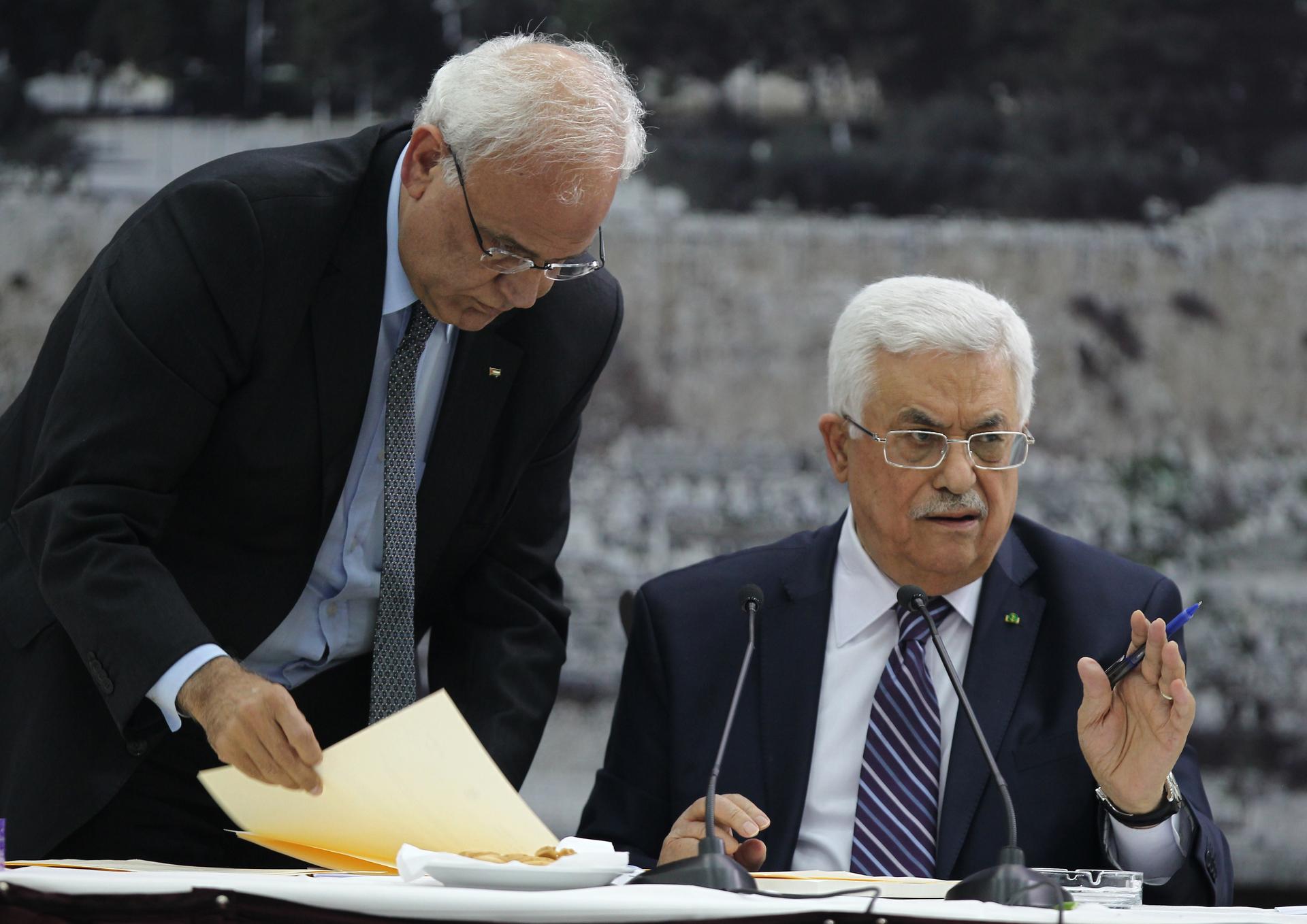What the heck just happened with the Israel-Palestine peace talks?
Palestinian president Mahmud Abbas gestures as he signs a request to join 15 United Nations agencies at his headquarters in the West Bank city of Ramallah on April 1
JERUSALEM — A key pillar of the latest round of Israeli-Palestinian peace talks has been that Palestinian President Mahmoud Abbas would not proceed with unilateral efforts at international recognition of Palestinian statehood: He'd wait until negotiations produced a fully-fledged state, recognized by the UN.
But Tuesday evening, only hours after Israeli and American officials indicated that the peace talks were back on track and Palestinians had promised not to approach international organizations until the end of April, Abbas instead signed fifteen application forms to join various UN agencies and conventions on live television.
"The Palestinian leadership has voted unanimously in favor of joining the international organizations,” Abbas said. “We do not want to use this right against anyone and we are especially not aiming to clash with the US administration. We wish to maintain good relations with the US because they are helping us and making serious efforts."
In this single move, the Palestinian Authority threw into question its path towards peace with Israel, financial assistance to the Palestinian Authority, and the Palestinian diplomatic mission in Washington, which under an act of Congress can be suspended due to such unilateral moves. John Kerry promptly canceled a Wednesday meeting with Abbas.
What happened, and where do the parties involved go from here?
The fact is, American and Israeli diplomats were blindsided by the move, and a full day later, Abbas's reasons for throwing down the gauntlet remain unclear. Some Palestinian analysts believe that the dramatic act of defiance strengthens his public profile and may help prepare Palestinians for a long, tough final stretch of negotiations.
After a feverish night on the phones, American and Israeli experts have concluded the Palestinians are hoping the move will provide them with greater leverage in ongoing talks, and are not walking away from the negotiating table.
But the high-stakes gamesmanship has left the peace negotiations — the Obama administration's signal foreign policy initiative — on the very brink of collapse. Late Wednesday, in a last-ditch attempt to salvage the peace process, Washington announced that US Special Envoy Martin Indyk was convening Israeli chief negotiator Tzipi Livni and her Palestinian counterpart, Saeb Erekat, tonight in Jerusalem.
In Vienna, where he called off his planned return to Jerusalem and Ramallah, a clearly frustrated Kerry cautioned journalists it would be "premature" to conclude the American-brokered talks had failed, saying that “leaders on both sides have to make the decisions, not us. It’s up to them to decide what they are going to do with each other, for each other, for the future, for the region, for peace.”
The Washington Post reported a senior administration official saying that "Kerry has gone as far as he can as mediator."
Speaking on Israel Army Radio, Amjad el Omari, a senior editor at the Palestinian newspaper Al Quds, said he expected negotiations with Israel to resume within two weeks, and that Abbas' move represented the "despair" Palestinians feel about the progress of the talks.
Abbas claimed his move came in reaction to Israel's failure to free the fourth scheduled group of 26 Palestinian prisoners over the weekend, but by midday Wednesday a statement released by the Palestine Liberation Organization's Negotiations Affairs Department seemed to anticipate a skeptical reception to this justification.
Conceding that "the release of prisoners was not formally linked to the negotiations process," the document proceeded to answer some anticipated questions: "Doesn’t this mean the Palestinians are breaking their commitment?" read one. The response: "No, this does not mean that negotiations process is over. President Abbas made this point clear during his announcement on Tuesday April 1st. Indeed, the PLO remains committed to this 9 month process, which ends on April 29."
Israeli Prime Minister Benjamin Netanyahu, who was reported to have agreed to the release of about 400 Palestinian prisoners in exchange for the continuation of talks, faces considerable opposition within his own coalition.
As a sweetener for his right-wing challengers, Netanyahu seemed poised to announce the release of American Jewish spy Jonathan Pollard, imprisoned since 1987.
But that move has been almost universally panned, with US intelligence officials blasting the possible deal, John McCain calling it an act of "desperate diplomacy" and editorial boards on both sides of the Atlantic calling it everything from “sign of America’s desperation,” in the New York Times, to "indecent" according to the Israeli tabloid Yedioth Acharonoth.
In Jerusalem, the parlour game has suddenly shifted from Kerry-watching to scrutinizing the inscrutable face of Martin Indyk, his envoy, for any indication of news.
Martin, your move.
